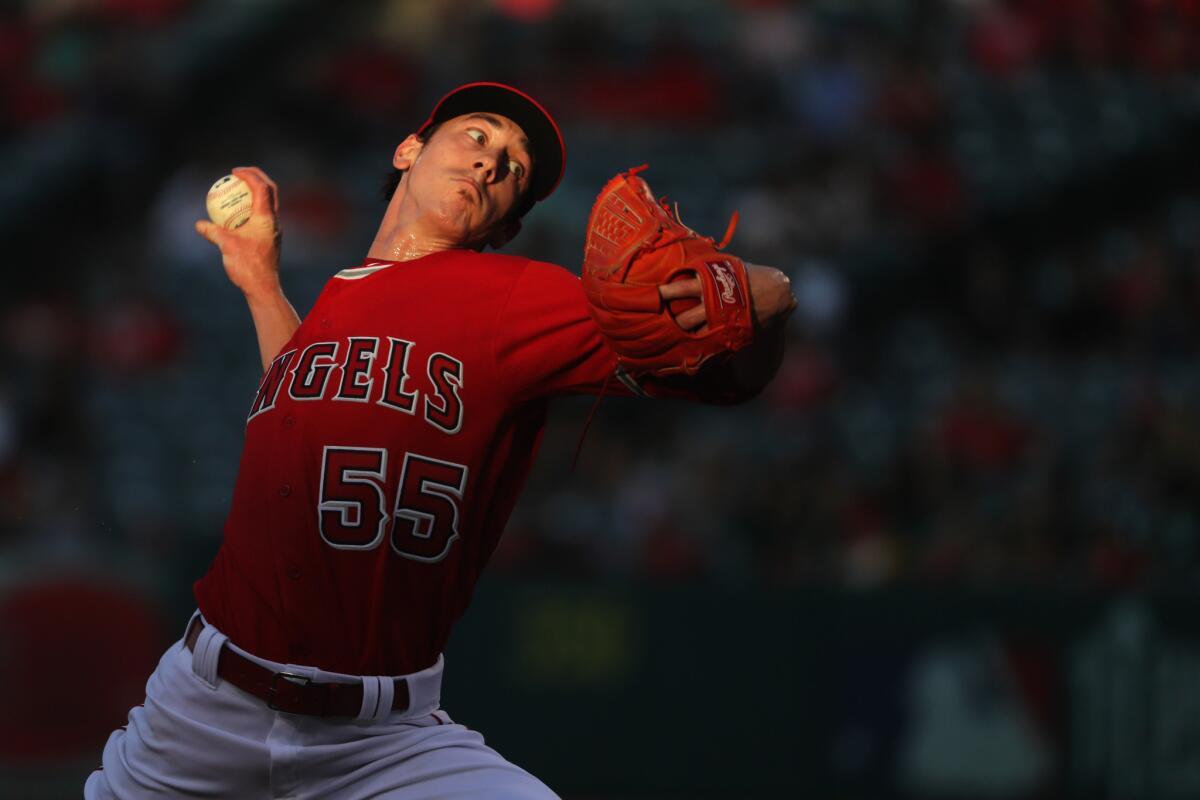Column: Tim Lincecum hopes his time with Los Angeles Angels jump-starts a career rebirth

- Share via
The scenes were almost unbelievable.
Late in the 2014 season, the San Francisco Giants would be ahead or behind by several runs and Tim Lincecum would enter the game to pitch an inconsequential inning or two.
Inconsequential, but not insignificant, not to the fans at AT&T Park, who would stand and cheer louder than they had cheered all game.
It didn’t matter to them that Lincecum was no longer winning Cy Young awards or leading the league in strikeouts. He was theirs and they adored him.
Los Angeles had Kobe Bryant. New York had Derek Jeter. The Bay Area had Tim Lincecum.
“Pretty special,” Lincecum said.
He could still be there if he wanted, pitching in relief, making an occasional start, taking in applause every time he stepped on the mound. His role in transforming the Giants into World Series champions would guarantee he would be revered for the remainder of his career.
Instead, the 32-year-old Lincecum will be making his third start for the Angels on Tuesday, pitching in front of fans who don’t feel they owe him anything.
Why?
“I have my own personal goals, when I finally get a full calendar year behind me,” Lincecum said. “I want to win 20 games. I want to go back to throwing 200-plus innings.”
He didn’t think he could do that if he stayed with the Giants, who didn’t have a place for him in their rotation.
There are every-man qualities about Lincecum that explain his popularity in the Bay Area.
He broke into the major leagues when he was only 22, which made him popular with children. He is generously listed at 5 feet 11, which made the average fan more inclined to cheer for him. His previously shoulder-length hair made him relateable to people he described as “quirky.” He was once in legal trouble after he was cited for possessing marijuana, which he believes made him appear human to fans who “made mistakes and have made better decisions afterwards.”
Except Lincecum isn’t an every man.
When he thought about re-signing with the Giants as a reliever, he didn’t think of it as staying in his adopted home.
“The bullpen seems more like a settling kind of thing,” he said, “and I don’t want to settle quite yet.”
Wasn’t he taking a risk by venturing out of his protective bubble in San Francisco?
Lincecum shook his head.
“I just don’t look at it that way,” he said.
When he decided last month that he was recovered from a hip operation and ready to pitch again, he wasn’t looking for a hospitable environment as much as an opportunity to showcase himself.
He wanted starts. The injury-depleted Angels wanted a starter. So he signed with the Angels.
“I knew what I was fighting for,” he said. “This was the opportunity that presented itself.”
Whereas some scouts predict this will be the beginning of the end for Lincecum, he sees this as the start of his professional rebirth.
By pitching well over the remainder of the season, he figures he could earn a place in a rotation next year. But that’s not enough for him. Once he’s there, he intends to dominate again.
How he’ll do that is something he’s still figuring out.
His fastball, which used to touch 99 mph, is now in the low 90s. He limited the Oakland Athletics to one run in six innings in his first start for the Angels. Five days later, he lasted only three innings against the same opponent, giving up four runs.
“I think that’s what the game’s about,” Lincecum said. “The game’s always changing and there’s no one way to win games and there’s no one way to pitch. And people change all the time. Like myself. My body’s changed.”
He pointed to his hip and continued, “Even without this, my body has changed. I have to learn to work with that and find different ways to adapt, on a physical level, as well as a pitch IQ level.”
He smiled.
“I think I like pitching with my brain,” he said. “It was fun pitching with a bunch of raw stuff for a while. Now, it’s using my brain, like I’ve been doing for the last three years. I’m not the smartest pitcher, I don’t have the best IQ, I still get flustered in situations, I get overwhelmed, but I’m going to do my best to stay calm during those situations, stay within myself. I know that’s cliché, but it’s kind of made more sense to me as I’ve gotten older.”
He is confident the public will be on his side again.
“People can respect that and appreciate that,” he said. “I think fans do.”
dylan.hernandez@latimes.com
Twitter: @dylanohernandez
More to Read
Go beyond the scoreboard
Get the latest on L.A.'s teams in the daily Sports Report newsletter.
You may occasionally receive promotional content from the Los Angeles Times.





